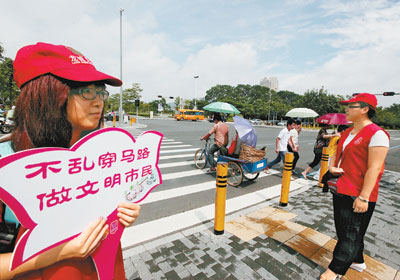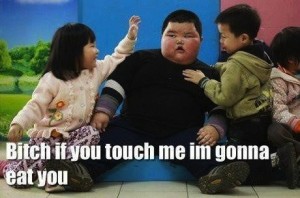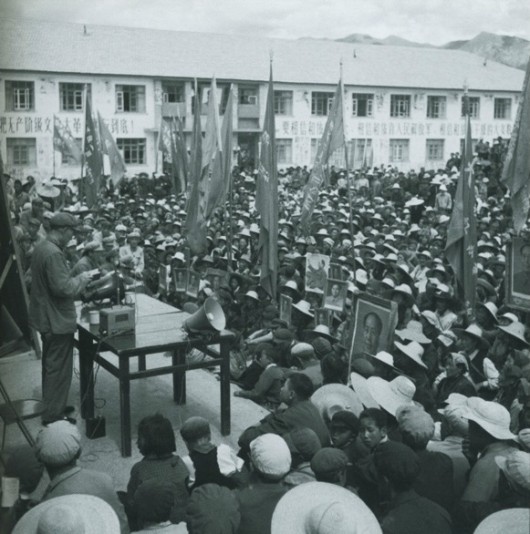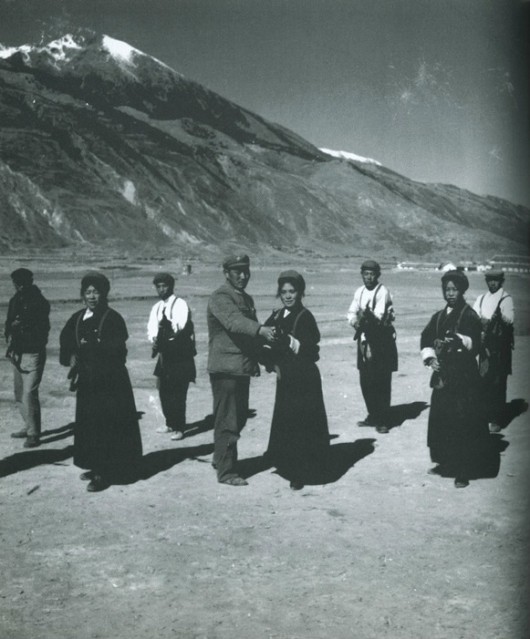Blogs » Society » Shenzhen Rolls Out Legislation To Enforce “Civilized” Behavior, But Will It Work?
Blogs » Society » Shenzhen Rolls Out Legislation To Enforce “Civilized” Behavior, But Will It Work? |
- Shenzhen Rolls Out Legislation To Enforce “Civilized” Behavior, But Will It Work?
- GitHub Has Been Unblocked, Maybe
- Confused senior yells ‘This is China!’ in Baltimore
- Special Edition of Come Correct
- No. 3975: Vintage Army Gear for Men
- Early Bird Signups for ASAS
- MythBusters Plays With Chinese Popcorn Maker… Or Is It A Bomb?
- Escape Shanghai: The Varkala Beaches in India
- Teachers from UK shocked by Chinese multiplication table
- China’s Success Produces A Soft Generation
- Li Na Explains Serving Ball 10 Rows Into Stands: “I Want To Have Good Communication With The Fans”
- India Fears Encirclement By An Electronic String Of Pearls
- Dish of the Day: Potstickers @ Laoyafensitang
- Hong Kong's plans to protect corporate data spark backlash
- Presented By:
- The Double Tragedy Of The Cultural Revolution In Tibet
- Court suggests women married to gay men be able to seek annulment
- World's greatest dad builds son a car
- Chinese Colonel warns Australian 'lamb' away from US 'tiger'
- The chase for growth in western China could cause “huge surge in pollution”
| Shenzhen Rolls Out Legislation To Enforce “Civilized” Behavior, But Will It Work? Posted: 23 Jan 2013 08:58 PM PST Shenzhen prides itself on being one of China's most "civilized" cities. Now it's drafting legislation to back it up. On March 1, Shenzhen will become the first Chinese city to enforce civil behavior by law. According to Shenzhen Daily:
The law is the result of a year's worth of public debate last year. Both locals and expats were asked to list the most uncivilized behaviors prevalent in the city along with suggested punishments. Originally, fines for violators were to range from 200 yuan for spitting and littering to 500 yuan for smoking in non-smoking areas to 10,000 yuan for vandalism of public facilities. However, the final draft is likely to leave out specific numbers to allow for more situation-based enforcement. Violators will also have the option to apply for community service to offset up to half of their fines. The public generally supports the law, but raised questions about it. Some, like office worker Yang Chao, thinks the law lacks the specifics to be effective. As quoted in SZ Daily: "How can you fine passengers for littering on a bus? If someone vomits on a bus because of carsickness, should he or she be fined too?" Meanwhile, expat Kevin Smith doesn't think the law goes far enough. "It's a good law, but something is missing, I regularly see parents or grandparents let their children pee on the floor, this should be added to the list," he told SZ Daily. But perhaps the toughest challenge the city will face is enforcement, which will be carried out by the notorious chengguan. As China Daily reported last July:
We wonder why he feels that way. Civility law to take effect March 1 (Shenzhen Daily) |
| GitHub Has Been Unblocked, Maybe Posted: 23 Jan 2013 08:30 PM PST The social coding website GitHub, which fell on the wrong side of the Great Firewall on Monday, has apparently been restored on the mainland, though as you can see from the above via GreatFire.org, tests have yielded contradictory results. According to Global Times:
But was it unblocked because of the social media protests? It's hard to tell at the moment, but tech observers have noted their skepticism.
John Artman, our tech contributor, writes in: I agree with Charlie. Kaifu Lee is one of the "leading intellectuals" that was invited for tea after the Nanfang incident and the "protest" was only on Weibo with only 75,000 forwards (seems like a large number, but not in proportion to Chinese population or active users of Weibo). There's a few different possible reasons: MIIT, after possible lobbying from bigger software firms, realized that software development would halt after blocking GitHub. Also, could be a huge fluke where GitHub was blocked after running afoul of automatic blocking from GFW (controversial URL/content). GT's report also quotes an anonymous plug-in software creator who claims the reason for the original censorship was not, as widely speculated, due to the railway ministry's ticket-buying site.
As always, trying to figure out the how and why of website censorship in China remains an exercise in futility and frustration, like reading tea leaves inside a tea bag dropped into a cauldron. US tech website back online (Global Times) |
| Confused senior yells ‘This is China!’ in Baltimore Posted: 23 Jan 2013 08:04 PM PST By LAO REN BALTIMORE (China Daily Show) – Zhao Binglai, a veteran of the Long March and a former ousted official, confusedly shouted "This is China!" at care workers this afternoon at the Cedar Woods Homes Residential Community in Baltimore, Maryland. Staff who helped Zhao, 78, back into bed were quick to offer him a 'snack pack.' After resting, Zhao told media that he realized that Baltimore was not, in fact, part of China and suggested his orderlies drink plenty of hot water. Local historian James Anderson, 62, says that Chinese people have been visiting Baltimore since 1859, when the first recorded Cantonese immigrant to the state was accidentally lynched. Anderson says it is still quite normal for many elderly Chinese-Americans to refer to China's sovereignty, simply in order to explain an absurd or illogical situation. "This is China" is a commonly heard phrase in the People's Republic, most often used when someone is badly losing an argument. The phrase supposedly dates back to the early Qin Dynasty (221-206 BC), after the Emperor Qinsihuang was proudly surveying a map of the first unified, multi-ethnic and centralized China. When a courtier asked Qinsihuang why the map had to be drawn with slaves' blood, the emperor retorted with the immortal remark. The phrase went mainstream in 1951, when the 14th Dalai Lama, after receiving a letter from the People's Liberation Army, pointed at the grounds of the Potala Palace and said, "This is China?" Follow breaking China news at @chinadailyshow on Twitter |
| Special Edition of Come Correct Posted: 23 Jan 2013 07:58 PM PST |
| No. 3975: Vintage Army Gear for Men Posted: 23 Jan 2013 07:33 PM PST |
| Posted: 23 Jan 2013 07:18 PM PST |
| MythBusters Plays With Chinese Popcorn Maker… Or Is It A Bomb? Posted: 23 Jan 2013 07:29 PM PST The smart fellas over at Discovery Channel's MythBusters recently decided to take a closer look at a traditional Chinese popcorn-maker, which I can tell you from experience makes a great (cheap!) snack. Vaporized water, liquefied starch, relief of pressure, cooking in a bomb suit… this segment has it all. "Notice that the way that it exploded creates shape that's more like puffed rice than it actually is popcorn because of the speed of the kind of plasma form of the starch bursting out," co-host Jamie Hyneman muses. "I think that if we took the pressure down or just didn't do it as long it'd probably be really good." I'd still eat it. (H/T SCMP) |
| Escape Shanghai: The Varkala Beaches in India Posted: 23 Jan 2013 06:09 PM PST |
| Teachers from UK shocked by Chinese multiplication table Posted: 23 Jan 2013 09:05 AM PST Jacky Huang | January 23rd, 2013 From Sina:
The teachers from UK asking questions January 17th, An English delegation of more than 50 teachers and deans from top 25 middle schools and primary school in UK came to Ningbo city in Zhejiang Province to attend math classes for learning and sharing. They went to two schools: Ningbo Wanli International School and Ningbo Gaoxin Foreign Language School. One UK headmasters said that Chinese kids' are well known for their math abilities in the world. Teachers in UK always puzzled about why always the Chinese kids got the first prize in international math competitions? They came all the way here to China, aiming to bring some insights back about the math teaching. Until the afternoon yesterday, they had listened four math classes. The result is that, they were totally shocked by the multiplication table and Chinese kids' math skills. Standing all the time through listening During the math classes yesterday, the chairs for the UK teachers were all left unseated. They walked into the students, checking their textbooks, notebooks, and took photos with their cellphones. The Chinese kids did not let them down. 72÷3=? On student went to the stage and quickly wrote the correct answer of 24. This student said the answer can be quickly concluded through the use of multiplication table. The 12 teachers at the scene were surprised by the method. One English teacher said they don't have such multiplication table in UK. If they want to solve the problem above, the process will be like this: 10×3=30,10×3=30,4×3=12,then add them up and get 24. For this kind of problem, students in UK will have to learn through several lessons to solve them successfully. But for kids, is it too hard to apply the Chinese way of education? One English teacher did not think so. He thought the standard of English education is too low. Fail to learn the multiplication table, because of the pronunciation After the math classes, UK teachers showed their interests in learning the multiplication table. But the dean of primary school, Zheng said that the multiplication table was a traditional method in China which cannot be easily learned by English teachers because of the pronunciation. The multiplication table has five Chinese characters maximum, and is very clear at a glance. But when translated into English, the sentences will be too long. For example, "九九八十一" is translated as "nine nine eighty one". Although they failed to learn that, the experience was valuable. The teachers said that they were going to document this investigation into files and report them to the Department of Education of UK, which they hoped would be helpful to the primary math education in UK. |
| China’s Success Produces A Soft Generation Posted: 23 Jan 2013 05:55 PM PST China's multi-decade quest for rapid development has by all measures been a stunning success. However, this has not come without a few unintended consequences. The physical conditioning – or lack thereof – of 90s-generation youth has been called a "crisis." Sun Yunxiao, author and deputy director of the China Youth and Research Center in Beijing, told AP, "Our economic power has grown while our people's physiques have not only failed to improve, but have deteriorated. That's unacceptable. This is something that worries the nation." Last year, two college students died during university-mandated fitness runs, leading other schools to scale back or cancel athletics events during annual meets. And the education ministry reports that male university students run the 1,000-meter race 14 to 15 seconds slower than their peers from a decade earlier. Women ran their 800-meter race 12 seconds slower. The results of other tests show similar declines. Not surprisingly, one area of growth has been in body weight – student obesity rates are climbing. Clearly the pressure cooker that is the Chinese education system just does not leave much room for physical fitness.
But it is not only educators who are taking notice. Some are calling this trend – especially among the boys – a threat to China's future. Check out what Major General Luo Yuan said in Global Times (quoted by AP again):
Perhaps the army is right to worry. Sun Yunxiao's research has found that not only are young Chinese boys between the ages of 7 and 17 getting physically weaker, they are also 2.54 centimeters shorter than their Japanese counterparts. This has all produced some interesting paradoxes for modern China: a nation forged on a history of collective sacrifice and the often superhuman physical exertions of its people now has reason to fear it is producing youngsters who can't pull their weight. Which brings us to another paradox: how is China winning all those gold medals? AP again:
A topic for another time, perhaps. |
| Li Na Explains Serving Ball 10 Rows Into Stands: “I Want To Have Good Communication With The Fans” Posted: 23 Jan 2013 11:43 AM PST Ever since advancing to the 2011 Australian Open final, becoming the first Chinese player to appear in a Grand Slam singles final, Li Na has been somewhat of a media darling in Melbourne. The sixth-seeded Wuhan native beat Agnieszka Radwanska 7-5, 6-3 on Tuesday to advance to the semis against Maria Sharapova, but not before serving up a bit of comedy on the court and the mic. Watch as the 30-year-old explains that serve of hers. Count USA Today's Chris Chase, who wrote the following, as smitten.
Li Na's hilarious excuse for her horrendous serve (USA Today) |
| India Fears Encirclement By An Electronic String Of Pearls Posted: 23 Jan 2013 10:45 AM PST Word from our man in Delhi that Indians are getting in a tizzy about their country being ringed by Chinese-built IT infrastructure and communications networks, already being likened to an electronic string of pearls. India's intelligence agencies have raised concerns … Continue reading → |
| Dish of the Day: Potstickers @ Laoyafensitang Posted: 23 Jan 2013 07:00 AM PST  Not all great eats in Shanghai are located within five metro stops of People's Square; some you find at the end of the line where city lights tussle with dusky flatlands. An hour's ride on Line 10 from Jiaotong University to Jiangwan Stadium gets you to a bitty food strip where lies Laoyafensitang and some of the best damn potstickers in town. [ more › ] Not all great eats in Shanghai are located within five metro stops of People's Square; some you find at the end of the line where city lights tussle with dusky flatlands. An hour's ride on Line 10 from Jiaotong University to Jiangwan Stadium gets you to a bitty food strip where lies Laoyafensitang and some of the best damn potstickers in town. [ more › ]     |
| Hong Kong's plans to protect corporate data spark backlash Posted: 23 Jan 2013 06:00 AM PST |
| Posted: 23 Jan 2013 06:00 AM PST |
| The Double Tragedy Of The Cultural Revolution In Tibet Posted: 23 Jan 2013 06:00 AM PST In Foreign Policy's introduction to its latest slideshow of rare photos from Tibet during the Cultural Revolution, the line that jumps out to me is the last one: "This installment of FP's Once Upon a Time series shows the Land of Snows from a long-forgotten period, when Tibet's enemy wasn't China, but itself." The line, I'm sure, was born out of evidence suggesting Tibetans were not mere victims to the Chinese destruction of their country. This is true in one sense: Tibetans participated in the Cultural Revolution. They participated, and continue to participate, in the very institutional bases of the revolution: the school systems, the police force, the government offices, and so forth. Melvyn Goldstein, in On the Cultural Revolution in Tibet (Berkeley, CA: University of California Press, 2009; chapter one is available here), quotes a Tibetan who says:
But rather than making the distinction between an enemy within and one without, I think it's more useful to consider the period from a ground-level, Tibetan perspective. Writer Tsering Woeser (the FP photos are from her father) offers a glimpse. The Chinese title of her book is Killing and Plunder (杀劫). The pronunciation of this title, sha jie, is a homophone with the Tibetan word for revolution (གསར་བརྗེ་), pronounced sar jé. She adds that the Tibetan word for culture (རིག་གནས་), pronounced rik né, is somewhat homophonous with the Chinese word for humanity (人类), pronounced ren lei. (See this Danwei article.) So what was the Great Cultural Revolution in Tibet? It was the Great Killing and Plundering of Humanity. It was a tragedy – an orgy of violence and pain – just as it was in the rest of China, but particularly painful due to Tibet's exceptionally strong connection with its culture and history. The most moving and powerful images in Foreign Policy's slideshow depict the mistreatment of monks and nuns, who were and are the most revered members of Tibetan Buddhist society. The tragedy of the Cultural Revolution in Tibet was not just in the bouleversement of long-held values and destruction of relics, but the trauma of religious conversion: when the Buddha and the Dharma were replaced by a peculiar new god and scripture in Mao and his Little Red Book. William is a Tibetologist on course to receive his doctorate in Tibetan and Chinese religions at the University of Virginia. He can be reached at wam6n@virginia.edu. When Tibet Loved China (Foreign Policy; photos by Tsering Dorjee, published in his daughter Tsering Woeser's book Forbidden Memory: Tibet During the Cultural Revolution) |
| Court suggests women married to gay men be able to seek annulment Posted: 23 Jan 2013 05:00 AM PST  China's women should be allowed to annul inadvertent marriages to gay men, said a Chinese court, as long as there are no children involved. The news has naturally set conservatives on edge but tickled the fancy of women's right groups. [ more › ] China's women should be allowed to annul inadvertent marriages to gay men, said a Chinese court, as long as there are no children involved. The news has naturally set conservatives on edge but tickled the fancy of women's right groups. [ more › ]     |
| World's greatest dad builds son a car Posted: 23 Jan 2013 04:00 AM PST  This guy is not going to be popular around the playground after making all other fathers look like Timothy Dalton to his Sean Connery, after he handmade his son a car! [ more › ] This guy is not going to be popular around the playground after making all other fathers look like Timothy Dalton to his Sean Connery, after he handmade his son a car! [ more › ]     |
| Chinese Colonel warns Australian 'lamb' away from US 'tiger' Posted: 23 Jan 2013 04:00 AM PST |
| The chase for growth in western China could cause “huge surge in pollution” Posted: 23 Jan 2013 01:38 AM PST If industrial growth in western China follows the same path as the east then environmental damage could be even more severe, warns Ma Zhong. Ma Zhong is dean of Renmin University's School of Environment and Natural Resources. |
| You are subscribed to email updates from Update » Blogs » Society To stop receiving these emails, you may unsubscribe now. | Email delivery powered by Google |
| Google Inc., 20 West Kinzie, Chicago IL USA 60610 | |












 People's Liberation Army colonel (and potential super villain) Liu Mingfu has issued a not-so-subtle
People's Liberation Army colonel (and potential super villain) Liu Mingfu has issued a not-so-subtle
Comments